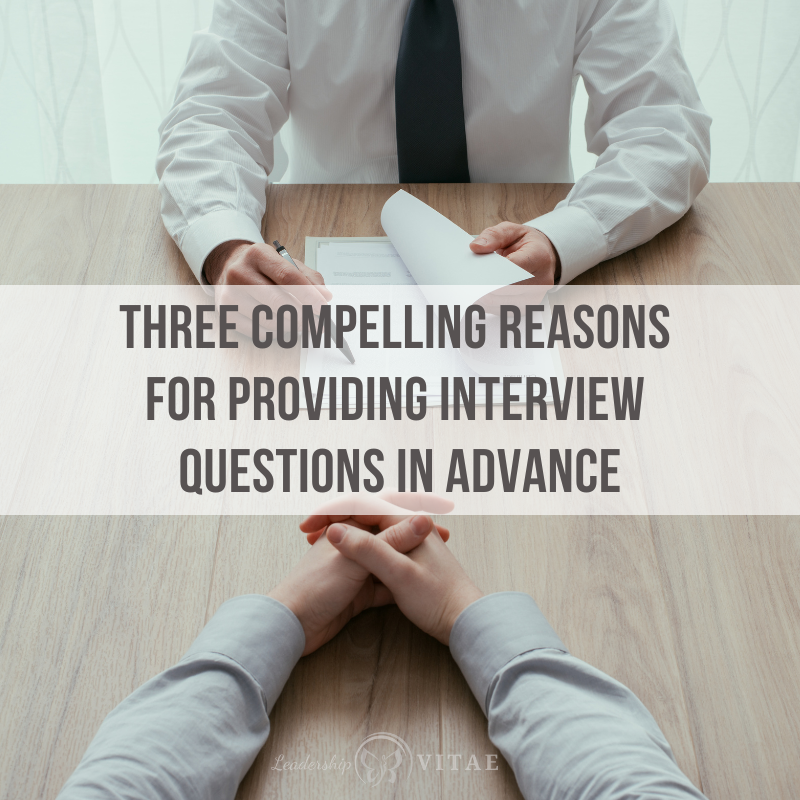
Recently, I was asked to participate in a panel interview as we sought to backfill a departing peer. While I’m always happy to help, there’s a part of me that strongly dislikes the traditional interview process. Strong word, but true. Why? Because I don’t think the process is particularly effective.
There are some things I’ve seen done that can help. Having a panel to get different perspectives on the same interactions is one. Standard questions that are relevant to the role are another.
But there’s one practice I’ve experienced that I think hands down should be adopted by all hiring managers. Giving questions to candidates in advance.
Now, some might say that you have to keep them guessing to see how prepared they are. Can they answer questions on the fly and maintain their cool? What that sounds like to me is trying to weed folks out with a gotcha.
Real people get nervous. May prepare and still be caught off guard. Rather than using a gotcha to get folks OUT, let’s allow preparation to see who we should keep IN.
Proper Prior Planning
The 7 P’s are a classic for a reason. Yes, we want to know the candidate is prepared. But can they read minds? If we want to ask generic questions that everyone asks, then by all means don’t share the questions. Assume they’ve prepared using AI and judge when they don’t sound rehearsed.
The reality is that in our work environment, we usually have time to prepare. When we’re invited to a meeting, we have a sense of the topic. If we’re doing a status update, we can prepare the information and anticipate questions. Meetings have a purpose, and we prepare for that purpose. When we run into questions we may not have the answer to, we can offer to follow up after the meeting. That’s not possible in an interview.
Expecting someone to come in cold without preparing for the questions isn’t representative of what will happen when they take the job. Instead, what about coming up with questions that require more thought and intention? Ones that result in personal stories of struggle and perseverance? If we share them in advance, we can get a sense of how they will prepare in the role.
Bias in action
When we ask questions on the fly, we are setting up our interview process to be exclusionary and biased. Full stop.
Some folks are more internal processors. They are more reflective and want to take time to consider an answer before providing it. Others process on the fly in real-time, often out loud.
That’s just one type of difference we may be inadvertently encouraging or discouraging through our typical interviews.
If we want to be neuro-inclusive, we acknowledge that everyone thinks and processes differently. By allowing folks to prepare ahead for the questions, we are giving everyone equal opportunity to lean into how their own thinking and processing work best.
When we lean towards one type of thinking/processing, we miss out on the benefits of other kinds. For example, if we play toward more extroverted thinking, we miss the deep contemplation and considerations that more introverted thinking may provide.
If we still want to get a sense of how they’ll respond in the moment, ask a clarifying question on their answer or the example provided. It gives a better sense of how a prepared employee may respond to an unplanned question regarding the topic at hand (and can help weed out AI prep someone may have done).
Nerves or not a fit?
When we level the playing field by giving everyone access to the questions in advance, it gives us a much better sense of how they will perform in the work environment.
Someone still might be nervous, but did they answer the questions well and provide relevant examples? Do the examples align and sound reasonable given past jobs they’ve held? Nerves aren’t a sign to pass on the person, any more than well-rehearsed responses are a sign that the person will perform in the role.
Instead, we consider their answers. If they have time to prepare and still never answer the question? Give an example that seems completely unrelated to what was asked? This is more indicative of how they will perform (or not) in the job. When they have time to prepare and don’t, it’s more likely to signal that they’ll struggle with work assignments.
Once I realized we COULD provide questions in advance, I wondered why we wouldn’t do that every time. It never occurred to me that it was possible until I experienced it. Just because we’ve done things a certain way doesn’t mean we have to continue. The work environment is constantly evolving…maybe the way we consider people to join it should too.
Have you ever provided or been provided questions in advance of an interview? What are your thoughts on the practice? I’d appreciate you sharing your thoughts in the comments.








